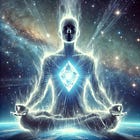The Courage to Bore People
Why spiritual intensity became your prison
Liberation Intel: What you'll discover—why spiritual intensity became your prison, how ordinariness protects your gifts, and when dullness serves discernment. For practitioners ready to stop performing depth using Energenetics principles.
I used to be fascinating.
Every conversation was an opportunity to dazzle someone with my insights, my spiritual experiences, my deep understanding of human nature. I was the person who could read your energy, decode your patterns, and offer profound wisdom about your life's journey.
People loved talking to me. I was magnetic, intense, transformational. I left every interaction feeling like I'd given someone exactly what they needed to hear.
I was also completely exhausted.
It took me years to realize that my need to be spiritually fascinating was just another form of people-pleasing. I was performing enlightenment, not living it. I was being "too much" because I was terrified of being "not enough."
The day I decided to become boring changed everything.
The Performance of Intensity
There's a particular type of spiritual person who's addicted to being "deep."
You know the type - they can't have a simple conversation about the weather without bringing up energy patterns or cosmic significance. They turn every casual interaction into a spiritual teaching moment.
I was that person.
I thought intensity equals authenticity. I believed that if I wasn't transforming someone's consciousness in every conversation, I wasn't being true to my gifts.
I mistook being overwhelming for being powerful.
But intensity isn't the same as depth. Often, it's the opposite. True depth doesn't need to announce itself. It doesn't need to dazzle or impress. It simply is.
The most profound people I know are often the most ordinary in casual conversation. They can talk about mundane things without feeling like they're betraying their spiritual nature. They understand that not every moment needs to be a transformational experience.
Why Being "Too Much" Keeps You Seeking Validation
Here's the uncomfortable truth about spiritual intensity: it's often a desperate attempt to prove your worth through your insights.
When you're constantly offering profound observations, reading people's energy without being asked, or turning every conversation into a teaching moment, you're essentially saying: "Please validate that I'm special. Please confirm that my spiritual gifts make me valuable."
This creates an exhausting cycle. The more you perform your specialness, the more you need people to react with awe or gratitude to feel worthy. When they don't - when they seem uncomfortable or try to change the subject - you either intensify your efforts or feel rejected.
You become addicted to being the most spiritually aware person in the room because it's become your identity. Without it, who are you?
The Liberation of Ordinary Conversations
The first time I had a completely mundane conversation about grocery shopping without mentioning energy patterns or spiritual significance, I felt... relief.
I didn't have to be "on." I didn't have to perform my wisdom. I didn't have to prove my worth through my insights. I could just be a normal person talking about normal things.
It was revolutionary.
I discovered that I could have depth without displaying it. I could be spiritual without being spiritually performative. I could offer value through my presence rather than my profound observations.
Most importantly, I learned that people often prefer the boring version of me to the intense version.
The Power of Becoming Uninteresting to the Wrong People
When you stop being spiritually fascinating, something magical happens: the energy vampires lose interest.
People who were drawn to your intensity for entertainment or free therapy sessions start looking elsewhere. Those who treated you like a spiritual vending machine - constantly asking for readings, insights, or advice - find other sources for their spiritual fix.
This isn't a loss. This is a filter.
The people who stick around when you become more ordinary are the people who value you for who you are, not what you can spiritually provide for them. They're interested in mutual relationship, not just extraction of your gifts.
Boring acts as a natural boundary. It protects you from people who only want your performance, not your authentic self.
The Difference Between Depth and Drama
Real spiritual depth doesn't need to be constantly expressed. It lives quietly in how you handle challenges, how you treat service workers, how you respond to inconvenience.
Drama masquerades as depth by being loud, intense, and attention-grabbing. But drama is actually quite shallow - it's all surface performance with little substance underneath.
I used to confuse the two. I thought if I wasn't being dramatically spiritual, I wasn't being authentic. I thought ordinary conversations were somehow beneath my evolved consciousness.
The truth is exactly opposite. The ability to be completely present during a boring conversation about traffic is far more spiritually mature than turning everything into a cosmic teaching moment.
How Dullness Becomes Your Greatest Protection
Boring people are energetically invisible to predators. They don't attract drama, manipulation, or people looking for spiritual entertainment. They live in peace because they're not broadcasting "fascinating content here!"
This doesn't mean becoming genuinely dull or suppressing your gifts. It means learning to modulate your energy appropriately. With the right people at the right time, you can still be profound. But you're no longer compelled to be profound with everyone all the time.
You become like a powerful radio that can tune to different frequencies. Sometimes you broadcast on the deep spiritual station. Sometimes you're on the mundane daily life channel. You choose based on what the situation actually calls for, not based on your need to prove your spiritual worth.
The Art of Strategic Ordinariness
Learning to be strategically ordinary is a advanced spiritual skill. It requires tremendous self-awareness and security in your own worth.
When someone starts probing for your spiritual insights, you can choose to give a perfectly mundane response. When someone tries to pull you into drama by making everything energetically significant, you can respond with practical questions about logistics.
This isn't being inauthentic. This is being discerning about when and where to share your depth. This is understanding that your spiritual gifts are precious and not everyone deserves access to them.
True spiritual maturity includes the wisdom to know when not to be spiritual.
The Relief of Not Being Everyone's Guru
The moment I stopped trying to be fascinating, I stopped attracting people who wanted me to solve their problems. I stopped being everyone's unofficial spiritual advisor, energy reader, and life coach.
This was initially terrifying. If I wasn't the wise spiritual person, who was I? How would people value me? What did I have to offer?
But as the fear subsided, relief took its place. I no longer felt responsible for everyone's spiritual growth. I no longer had to have insights on demand. I could just be a regular person living my life, available for genuine friendship instead of constant spiritual performance.
My relationships became more balanced. My energy stopped being constantly drained by people seeking free spiritual counsel. I had bandwidth for my own growth instead of spending it all on managing other people's spiritual journeys.
The Paradox of Authentic Power
Here's the paradox: the less I tried to be spiritually impressive, the more genuinely powerful I became.
When you're not performing your spiritual gifts, they become more authentic. When you're not desperately trying to prove your worth through your insights, your actual wisdom has more impact. When you speak less, your words carry more weight.
People began seeking me out not because I was constantly displaying my spiritual abilities, but because they sensed something solid and peaceful in my presence. They weren't attracted to my performance - they were attracted to my genuine centeredness.
This is the difference between performed spirituality and embodied spirituality. One exhausts you with its constant need for validation. The other sustains you with its quiet self-sufficiency.
The Invitation to Boring
If you're exhausted from being everyone's spiritual entertainment, if you're tired of performing your enlightenment, if you're ready to stop proving your worth through your insights - I invite you to try being boring.
Have a conversation about the weather without mentioning cosmic significance. Talk about your weekend plans without analyzing the spiritual lessons. Let someone share their problems without offering unsolicited wisdom about their soul's journey.
Notice how much energy you save when you're not constantly being "on." Pay attention to how much more peaceful your interactions become when you're not trying to transform everyone you meet.
You might discover, as I did, that the most radical spiritual act isn't being fascinating.
It's being willing to be ordinary.
Your worth doesn't depend on your ability to spiritually dazzle people. Your value isn't measured by the profundity of your insights or the intensity of your presence.
You are enough - even when you're talking about mundane things. Even when you're completely ordinary. Even when you're boring.
The people who truly see you won't need you to perform your specialness to recognize your worth.
Real spiritual power whispers. It doesn't need to shout, perform, or prove itself. It simply exists - present and available when needed, quiet and restful when not.
The courage to be boring is actually the courage to be authentically powerful.
German version: Der Mut, Menschen zu langweilen
Further Reading 📚
Conscious truth-telling vs. performance
When breakdown becomes breakthrough
Authentic vs. performative transformation







Parts of this really resonate with me! Thanks for sharing your experience!